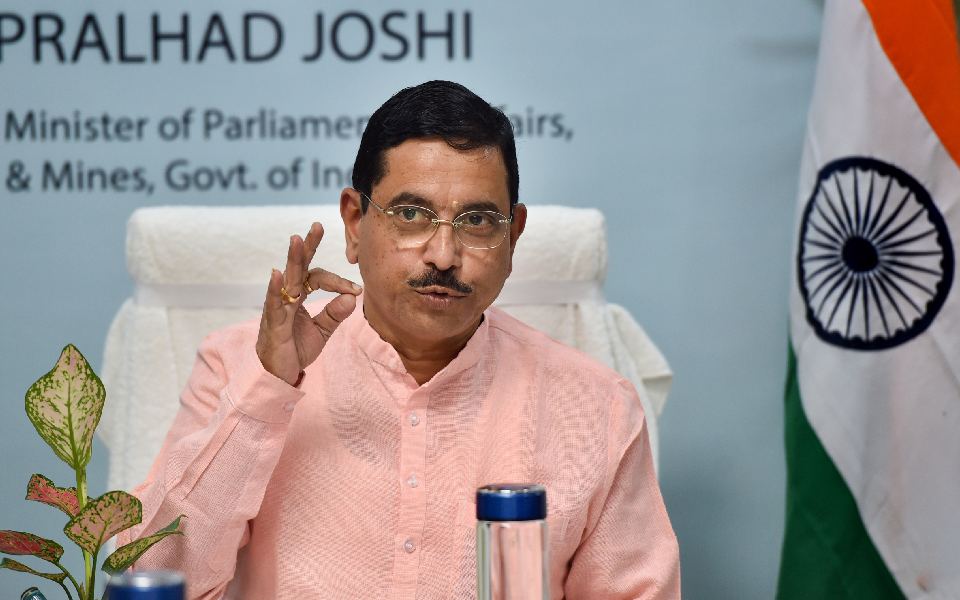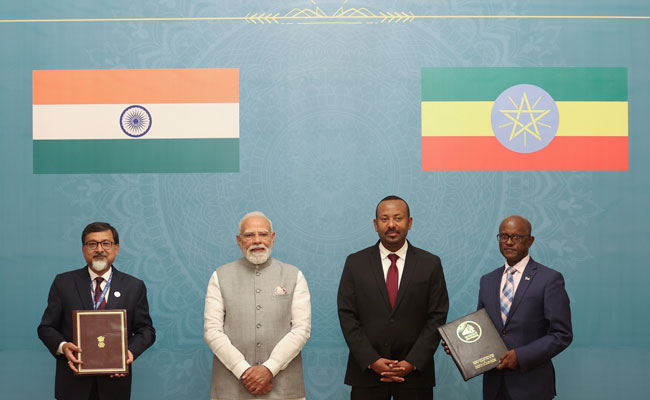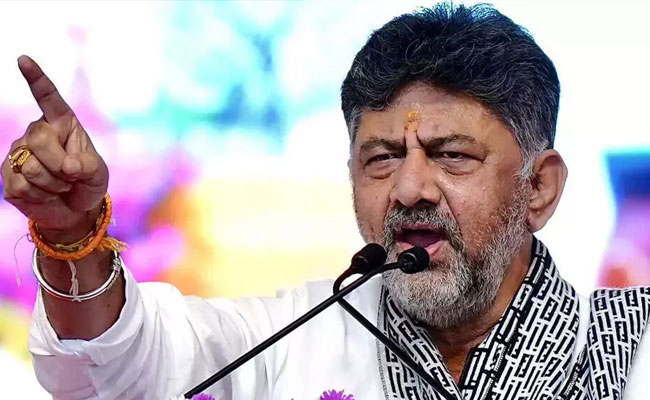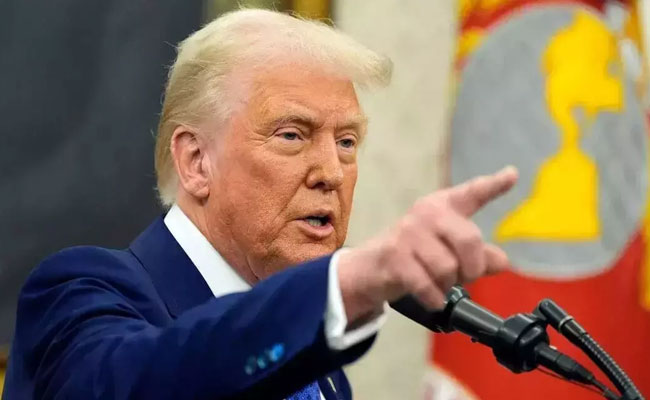New Delhi, Oct 14: Consumer Affairs Minister Pralhad Joshi on Monday criticised air purifier manufacturers for making false claims about their products, and called for increased consumer awareness ahead of winter when air pollution worsens in Delhi due to crop stubble burning in neighbouring states.
Addressing an event commemorating World Standards Day, Joshi expressed concern over misleading marketing tactics adopted by some air purifier companies.
"Discussion on air pollution has begun. Looking at Air Quality Index (AQI) on mobiles, people out of fear, go and buy air purifiers. Air purifiers make such false claims. ...We see air purifiers and so much is written but nothing is there in it. There is just a fan in it, yet claims are still made," the minister stated.
Joshi called for a collaborative approach involving the Bureau of Indian Standards (BIS), the consumer affairs ministry and consumers to address the issue.
While praising the BIS for their "exceptionally wonderful job" in recent years, the minister emphasized that more needs to be done.
"I do not blame BIS for this. BIS in the last few years has done an exceptionally wonderful job. But both BIS and the consumer affairs ministry and consumers together need to create awareness. It is important, and I strongly feel (this way)," the minister said stressing the collective responsibility in combating misleading product claims.
He emphasized the government's commitment to ensuring every Indian has access to safe, reliable, and high-quality products and services.
These comments come as concerns grow about air quality in major Indian cities and expansion of the air purifier market.
Joshi also announced plans to make BIS standards mandatory for public procurement on the Government e-Marketplace (GeM) portal. "BIS standards are partially implemented on GeM. We'll try to make it mandatory."
The minister highlighted the government's focus on quality standards, noting that Cabinet proposals now include global standard notes.
"These days, the tradition has started in the Union Cabinet. Wherever a bill to be introduced in Parliament comes before the Cabinet, the global standard note comes with it. That has been made mandatory for the Cabinet," he said.
This note mentions which countries perform best in the particular field, rules and how India can achieve it. "So, we have to match every Cabinet note with the global standards. This helps our government to make decisions to set high standards whether it is quality infrastructure or urban metro trains."
Implementation of standards at national level has been given a top priority by the government and is actively bringing more products under mandatory quality controls, he said.
He said that over 22,300 standards are currently in force, with 94 per cent harmonized with international standards. The number of Quality Control Orders has risen from 14 (covering 106 products) in 2014 to 174 (covering 732 products) now.
Also, 94 per cent of Indian Standards are harmonised with International Organization for Standardization (ISO) and the International Electrotechnical Commission (IEC).
Joshi stressed the interdependence of consumers and producers in fostering a quality ecosystem. He urged the BIS to take on more leadership roles in international standardization and fast-track the development of new standards.
World Standards Day, observed annually on October 14, aims to raise awareness about standards and their role in achieving Sustainable Development Goals.
Let the Truth be known. If you read VB and like VB, please be a VB Supporter and Help us deliver the Truth to one and all.
Addis Ababa (PTI): India and Ethiopia on Tuesday elevated their historical ties to a strategic partnership, as Prime Minister Narendra Modi held wide-ranging talks with his Ethiopian counterpart Abiy Ahmed Ali during which they discussed issues of bilateral and mutual interest.
Modi, who arrived here from Jordan on his maiden bilateral visit, was accorded a ceremonial welcome at the National Palace ahead of the bilateral talks, reflecting the vibrant India-Ethiopia relations rooted in shared history and a promising future.
"We are elevating India and Ethiopia relations to a strategic partnership. This step will provide new energy, new momentum and new depth to our ties," Prime Minister Modi said during the delegation-level talks.
He thanked PM Ali for his support in India's fight against terrorism. "The support of friendly countries in this struggle against terrorism holds great significance," Modi said.
"Today, we got the opportunity to deliberate on the key aspects of our cooperation, such as economy, innovation, technology, defence, health, capacity-building and multilateral cooperation. I am pleased that today, we have decided to double the student scholarship for Ethiopia in India," Modi said.
Modi said that India and Ethiopia have shared contact, dialogue, and exchange for thousands of years. The two countries, which are rich in languages and traditions, are symbols of unity in diversity, he added.
"Both countries are democratic powers committed to peace and the welfare of humanity. We are co-travellers and partners of the Global South. On international platforms, we have stood shoulder-to-shoulder," he said.
The two sides signed eight MoUs/agreements, including upgrading ties to 'Strategic Partnership', customs cooperation, establishing data center at the Ethiopian Foreign Ministry, UN Peacekeeping training cooperation, debt restructuring under G20, more ICCR scholarships and AI short courses for Ethiopians, and support for maternal and neonatal healthcare.
Modi said the African Union's headquarters in Ethiopia makes the country a meeting point of African diplomacy. "Inspired by the common vision of an inclusive world, in 2023, India ensured that the African Union became a G20 member," he said.
In 2023, during India’s G20 Presidency, the African Union was admitted as a permanent member of the G20.
Modi said that though this is his first visit, he felt a deep sense of belonging and warmth, reflecting the thousands of years of connection between the two countries.
On his part, Prime Minister Ali said the two countries share over thousands of years of connection through trade, diplomacy, education, culture and even in our food and traditions. "These ties continue to shape a deep friendship, collaboration and mutual respect between our people," he said.
"We also appreciate your consistent message that Africa's priorities must lead the partnership. These kinds of dignified, respectful messages for Africa are very important. Mr Prime Minister, keep pushing. That is the type of message we are expecting from all our trusted friends," Ali said.
He said this aligned fully with Ethiopia's development plan - African-owned, African-led, and African-defined.
"Today, we meet with a clear focus to shape a modern partnership, grounded in sovereignty, self-reliance and practical cooperation. Our cooperation is rooted in equality and South-South solidarity," he said.
"Our economy is performing strongly. Last year, we grew 9.2% and this year we are expecting 10.3% GDP growth. Besides GDP growth, our FDI inflow is also rising big time. India is the leading source for our FDI," he said.
"We have more than 615 Indian companies which are investing in Ethiopia. This all gives our cooperation a strong foundation of trust. I think our decision today that we elevate our historic relationship to a strategic relationship is the right decision," he added.
Ethiopia also conferred its highest award - The Great Honour Nishan of Ethiopia - on PM Modi. He is the first global head of state to receive this award.
Prime Minister Modi also went to the Friendship Park and Friendship Square in Addis Ababa with PM Ali.
In a warm and special gesture, PM Modi was earlier received by his Ethiopian counterpart at the airport and accorded a warm and colourful welcome.
"Ethiopia is a nation with great history and vibrant culture," Modi said.
PM Ali informed his Indian counterpart about the varieties of Ethiopian coffee during informal talks.
"At Addis Ababa airport, took part in a traditional Coffee Ceremony with Prime Minister Abiy Ahmed Ali. The ceremony beautifully highlights Ethiopia’s rich heritage," Modi said.
In a unique gesture, the Ethiopian Prime Minister drove Modi to the hotel.
On the way, he took a special initiative of taking PM Modi to the Science Museum and Friendship Park, which was not in the itinerary.
"Gratitude to Prime Minister Abiy Ahmed Ali for showing me glimpses of Ethiopian history and culture at the National Palace Museum in Addis Ababa. It was a powerful reminder of Ethiopia’s rich traditions," Modi said in a post on X.
The Nobel Peace Prize-winning Ethiopian PM’s special gestures show remarkable respect for Modi, sources said.
"Thank you Ethiopia for a welcome that was unforgettable. The Indian community showed remarkable warmth and affection. India-Ethiopia friendship is going to get even more robust in the times to come," Modi said.
When Modi arrived at the hotel, he was warmly welcomed by the members of the Indian community. Local artists performed dances. Some of them danced on the theme of the popular Hindi song 'Aisa Des Hai Mera' to welcome him.
On Wednesday, Modi will address the Joint Session of Parliament and share his thoughts on India's journey as the "Mother of Democracy" and the value that the India-Ethiopia partnership can bring to the Global South.
PM Modi arrived in Ethiopia from Jordan, where he held a one-on-one meeting with King Abdullah II at the Husseiniya Palace on Monday before the delegation-level talks.
India and Jordan also inked MoUs in the fields of culture, renewable energy, water management, digital public infrastructure and twinning arrangement between Petra and Ellora, aimed at giving a major boost to bilateral ties and friendship.
From Ethiopia, Modi will visit Oman on the final leg of this three-nation tour.





